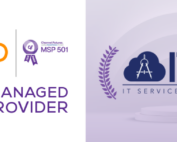Blog
5 Key Strategies Employed by Managed Service Providers (MSPs)
Share:
Small and medium organizations face a myriad of challenges that can significantly impact their operations. From cybersecurity threats to unforeseen disruptions, the need for businesses to be resilient and adaptable has never been more critical. Managed Service Providers (MSPs) play a pivotal role in helping businesses navigate these challenges and build a robust foundation for sustained success. Here are five key strategies MSPs employ to enhance business resilience and reduce risk:
- Proactive Cybersecurity Measures: One of the primary responsibilities of MSPs is to fortify an organization’s defenses against cyber threats. They go beyond merely reacting to incidents; instead, they adopt a proactive approach to cybersecurity. This involves implementing advanced threat detection systems, regular security audits, and continuous monitoring to identify vulnerabilities before they can be exploited. By staying ahead of emerging threats, MSPs contribute to minimizing the risk of data breaches and financial losses, thus bolstering the overall resilience of the business.
- Data Backup and Recovery Planning: MSPs understand the critical importance of data in today’s digital landscape. They work closely with businesses to develop robust data backup and recovery plans. Regularly scheduled backups, both on-site and in the cloud, ensure that essential data can be swiftly recovered in the event of a system failure, cyber-attack, or natural disaster. This proactive approach not only safeguards against data loss but also minimizes downtime, allowing businesses to resume operations quickly and efficiently.
- Scalable and Flexible Infrastructure: MSPs help businesses build a scalable and flexible IT infrastructure that can adapt to changing demands and unforeseen challenges. Through cloud services, virtualization, and other technologies, MSPs enable organizations to scale their resources up or down as needed, ensuring that the IT environment remains responsive to evolving business requirements. This flexibility is a crucial component of resilience, allowing businesses to navigate uncertainties without compromising efficiency.
- Strategic IT Planning and Consulting: MSPs serve as strategic partners, guiding businesses in aligning their IT strategies with overall business objectives. By conducting thorough assessments and providing expert advice, MSPs help organizations make informed decisions about technology investments, risk management, and compliance. This strategic approach ensures that IT infrastructure is not only resilient to current threats but also positioned to adapt to future challenges, contributing to long-term business sustainability.
- 24/7 Monitoring and Support: Business resilience requires continuous monitoring and immediate response to any issues that may arise. MSPs offer around-the-clock monitoring of IT systems and networks, enabling them to identify and address potential issues in real time. This proactive support minimizes downtime, enhances system performance, and ensures that businesses can operate smoothly even in the face of unexpected disruptions.
Managed Service Providers play a crucial role in enhancing business resilience by implementing proactive cybersecurity measures, developing robust data backup and recovery plans, building scalable and flexible IT infrastructure, offering strategic IT planning and consulting, and providing 24/7 monitoring and support. By partnering with an MSP, businesses can navigate the complexities of the modern digital landscape with confidence, reducing risks and ensuring a resilient and sustainable future.
Related Posts
Get a Free Consultation
Fill out the form below to get a free consultation and find out how we can make your technology hassle-free!





